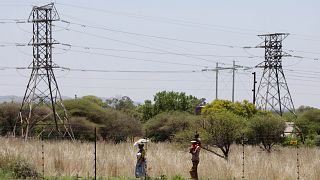South Africa
People Have Been Passing Away
Over 14,000 lives claimed by covid-19 in South Africa since the onset of the pandemic. Hence, the government has since put strict virus-prevention regulations in place. A cautionary move that seems to be exacerbating an already traumatic experience for those looking to mourn their loved ones as per the cultural tradition.
People in South Africa usually hold funerals over the weekend. Now, with the rise in the frequency of the number deaths due to coronavirus infections, funeral houses are busier than ever and many families are forced to hold burial ceremonies during the week.
Traditions Viewed as Risky
Tagu Sibeko, operations manager at Maziya Funerals in the township of Katlehong east of Johannesburg, explains the custom, "On Thursday, the family would come, wash the body and then after that we would coffin the body and then on a Friday we're going to live with the body and the body would stay at home till Saturday when the funeral happens. And obviously the body would be moved and taken to the cemetery. That has completely changed."
The usual cultural rituals to say goodbye to deceased loved ones are also not advised as they mainly include washing the body of the person by family. Much hygiene care and sanitary precautions have been in effect worldwide amongst essential workers handling corpses of those who pass away during these covid-times.
Usually, bodies are recovered from the hospital already heavily bagged for protection - and in some cases even labelled as “highly contagious,” without the intention of being opened. As such, the corporal washing custom is not possible.
Sibeko, also noted that this aspect of the South African burial tradition is what has been most disrupted during the pandemic.
A Downsized Affair
In addition, a South African burial ceremony is typically an elaborate occasion where several people gather to mourn the deceased — many even coming from out of town and staying for overnight vigils.
However, the current sanitary guidelines restrict the number of attendees to only 50 when normally they can go up to 100 in light of around 200 cases identified earlier this year by officials in the Eastern Cape province which were linked to funerals held in the cities of Port Elizabeth and Port St. Johns.
Carl van der Riet, Chief Operating Officer of Avbob funeral insurance company, explains how the attendee-restrictions on funeral services are affecting the South African people, "People process trauma in different ways and people rely on family networks to assist them and support them through times of bereavement like this. And that's, you know, the one potential area of impact is that people no longer have that level of support and are no longer able to process trauma."
In an already challenging time, the drastic change to the traditional burial rituals amongst family is daunting for many South Africans; However, so is having to pay a fine or face jail time for those found guilty of breaking these post-mortem sanitary regulations.
Pandemic Dying Down?
As the country continues to gradually ease lockdown regulations, many South Africans are hopeful that these traditional rituals will be permitted once again.
South Africa has over half a million confirmed covid-19 cases and currently claims the sixth-highest number in the world.













02:19
Abuja residents celebrate Igbo festival in grand style
02:19
"No Sign of Weakness": Burna Boy to release new album
02:20
Young designers grace the runway at Fashion Finest Africa’s show in Lagos
Go to video
Angélique Kidjo makes history as first black African artist on Hollywood Walk of Fame
02:20
In Morocco, women keep the art of traditional rug-weaving alive
Go to video
Paraguayan town celebrates vibrant Kamba Ra'anga festival with masks, fire and tradition